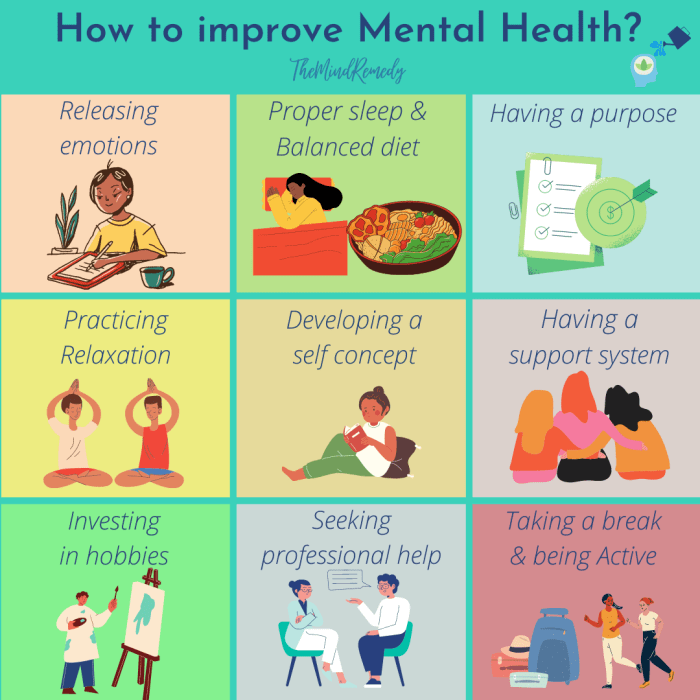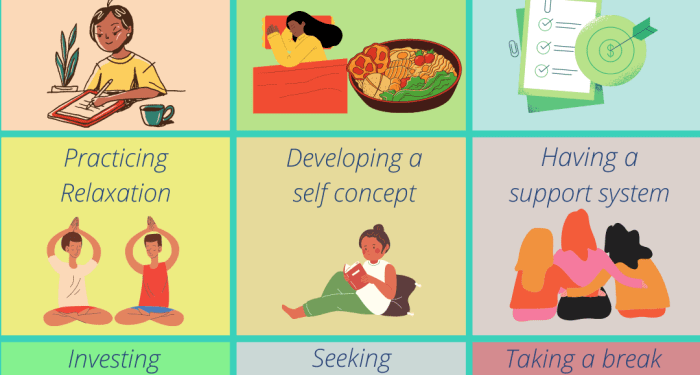As the spotlight shines on how to improve mental health naturally, this initial segment invites readers into a realm enriched with valuable insights, ensuring an informative journey that is both engaging and refreshingly unique.
The following paragraphs delve into the specifics of the topic, offering a detailed exploration of various aspects related to enhancing mental well-being through natural means.
Importance of Mental Health
Maintaining good mental health is crucial for overall well-being as it impacts every aspect of our lives. Our mental health influences how we think, feel, and act on a daily basis, affecting our relationships, work performance, and physical health.
Impact on Daily Life
Our mental health greatly influences how we handle stress, make decisions, and interact with others. It can affect our ability to cope with challenges, maintain relationships, and achieve our goals.
Benefits of Good Mental Health
- Improved mood and emotional well-being
- Enhanced resilience to cope with stress and adversity
- Increased productivity and performance
- Better relationships and social connections
- Enhanced overall quality of life
Lifestyle Changes
Making positive lifestyle changes can have a significant impact on mental health. These changes can include incorporating regular exercise into your routine, maintaining a balanced diet, getting enough sleep, managing stress effectively, and engaging in activities that bring you joy and relaxation.
Role of Exercise
Exercise plays a crucial role in improving mental health by releasing endorphins, which are known as “feel-good” hormones. Regular physical activity can help reduce symptoms of anxiety and depression, enhance mood, boost self-esteem, and improve overall cognitive function. Whether it’s going for a walk, practicing yoga, or hitting the gym, finding an exercise routine that works for you can have a positive impact on your mental well-being.
Impact of Diet
A balanced diet rich in nutrients plays a vital role in supporting mental well-being. Certain foods like fruits, vegetables, whole grains, lean proteins, and healthy fats can provide essential nutrients that support brain function and mood regulation. On the other hand, consuming excessive amounts of processed foods, sugar, and caffeine can negatively impact mental health by causing fluctuations in blood sugar levels and energy crashes.
Making conscious choices about what you eat can help improve your mental health and overall well-being.
Stress Management Techniques

Managing stress is crucial for improving mental health. By incorporating various stress management techniques into daily routines, individuals can experience reduced anxiety levels and enhanced overall well-being.
Mindfulness and Meditation
Mindfulness and meditation are powerful tools for reducing stress. By practicing mindfulness, individuals can focus on the present moment and cultivate a sense of calmness. Meditation techniques, such as deep breathing exercises or guided visualization, can help in relaxing the mind and body, leading to decreased stress levels.
Hobbies and Leisure Activities
Engaging in hobbies and leisure activities can be effective in managing stress levels. Activities such as painting, gardening, playing musical instruments, or engaging in sports can provide a much-needed break from daily stressors. These activities can help individuals relax, unwind, and recharge, promoting a sense of well-being and happiness.
Connection and Support
Social connections play a crucial role in maintaining good mental health. Building strong relationships and having a support system can significantly impact our overall well-being.
Importance of Social Connections
- Interacting with others can reduce feelings of loneliness and isolation, which are detrimental to mental health.
- Having a network of friends and family members provides a sense of belonging and support during challenging times.
- Engaging in social activities can boost mood and increase feelings of happiness and fulfillment.
Role of Support Systems
- Support systems offer emotional validation, encouragement, and guidance when facing difficulties or stress.
- Knowing that there are people who care about us can alleviate anxiety and depression symptoms.
- Supportive relationships can help in coping with trauma, grief, or other mental health struggles.
Tips for Building Strong Relationships
- Communicate openly and honestly with your loved ones to foster trust and understanding.
- Make time for social interactions, whether it’s through face-to-face conversations, phone calls, or video chats.
- Show empathy and compassion towards others, and be willing to offer your support when needed.
- Join community groups, clubs, or organizations that align with your interests to meet new people and expand your social circle.
- Seek professional help or therapy if you’re struggling to connect with others or maintain relationships.
Sleep and Mental Health
Sleep plays a crucial role in mental health, as it directly impacts our emotional well-being, cognitive function, and overall mental state. Poor sleep quality can lead to increased stress, anxiety, depression, and difficulty in managing emotions.
The Impact of Sleep Quality on Mental Health
Quality sleep is essential for maintaining good mental health. When we don’t get enough restful sleep, our brain’s ability to function properly is compromised. This can result in mood swings, irritability, lack of focus, and even more severe mental health issues like depression and anxiety.
- Lack of sleep can disrupt neurotransmitters in the brain, affecting mood regulation and emotional stability.
- Chronic sleep deprivation can increase the risk of developing mental health disorders.
- Sleep disturbances are often linked to conditions like bipolar disorder, PTSD, and ADHD.
Improving sleep quality can significantly enhance mental well-being and overall quality of life.
Tips for Improving Sleep Hygiene
Developing good sleep hygiene practices can help improve the quality of your sleep and positively impact your mental health.
- Establish a regular sleep schedule and stick to it, even on weekends.
- Create a relaxing bedtime routine to signal to your body that it’s time to wind down.
- Avoid screens (phones, tablets, computers) at least an hour before bed, as the blue light can disrupt your sleep cycle.
- Keep your bedroom dark, quiet, and at a comfortable temperature to promote restful sleep.
- Avoid caffeine and heavy meals close to bedtime, as they can interfere with your ability to fall asleep.
Summary
Concluding this discussion, we encapsulate the key takeaways in a compelling manner, leaving readers with a profound understanding of the significance of prioritizing mental health and embracing natural methods to nurture it.
Q&A
How can regular exercise benefit mental health?
Regular exercise can boost mood, reduce stress, and improve overall mental well-being by releasing endorphins and promoting better sleep.
What role does social connection play in mental health?
Strong social connections can provide emotional support, reduce feelings of isolation, and enhance mental resilience.
How does sleep quality affect mental health?
Poor sleep quality can lead to mood disturbances, cognitive decline, and increased stress levels, negatively impacting mental health.


